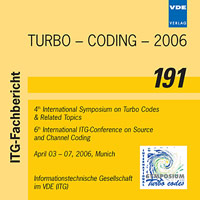MSE Comparison of Reduced-Rank Equalizers for Iterative Multi- User Receivers Based on EXIT Charts
Conference: TURBO - CODING - 2006 - 4th International Symposium on Turbo Codes & Related Topics; 6th International ITG-Conference on Source and Channel Coding
04/03/2006 - 04/07/2006 at Munich, Germany
Proceedings: TURBO - CODING - 2006
Pages: 6Language: englishTyp: PDF
Personal VDE Members are entitled to a 10% discount on this title
Authors:
Zeitler, Georg; Dietl, Guido; Utschick, Wolfgang (Institute for Network Theory and Signal Processing, Munich University of Technology, 80333 Munich, Germany,)
Abstract:
The use of the EXtrinsic Information Transfer (EXIT) chart for the analysis of iterative decoding schemes allows to discuss the convergence properties of concatenated (turbo) codes. Applied to iterative equalization, the EXIT chart can be used to evaluate the performance of the optimal linear equalizer (the Wiener filter) and its reduced-rank versions for different channel realizations. In this paper, we present a method to calculate the detector curve of the EXIT chart instead of obtaining it by simulating the transmission of bits over a channel. Furthermore, the presented method reveals the possibility of estimating the average Mean Square Error (MSE) at different iteration stages of a turbo detection system.


